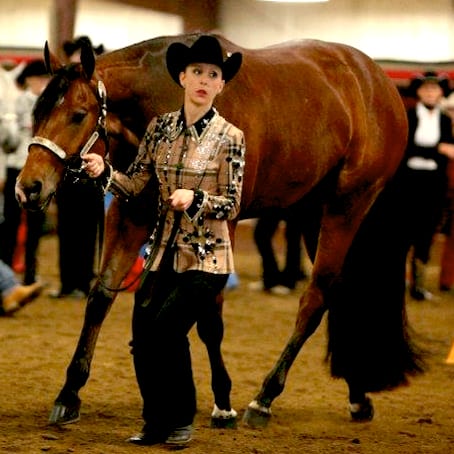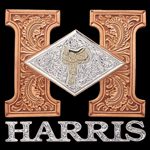Chemistry…all great relationships have it, and those that don’t are often doomed. Chemistry and connection are vital to human relationships. But what about the relationship between horse and rider? We all know the magic that occurs when a horse and rider share a strong connection – everything they do appears effortless. Granted, every great team is built upon hours of hard work, practice and skill. But what happens when, despite the rider’s best efforts, horse and rider chemistry is missing? Perhaps you’ve been there, or are there now. Rides are frustrating instead of fun, personalities clash, and it may feel as if nothing you’re doing to communicate with your equine partner is working.
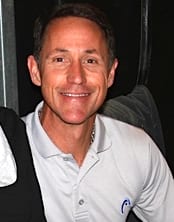 GoHorseShow spoke with several leading trainers and amateurs about the horse and rider connection, how to establish it, nurture it, and what happens when “it” just isn’t there.
GoHorseShow spoke with several leading trainers and amateurs about the horse and rider connection, how to establish it, nurture it, and what happens when “it” just isn’t there.
AQHA Professional Horseman Kevin Dukes of Dukes Performance Horses in Weatherford, Texas says miscommunication often rests at the heart of problems between horse and rider chemistry. “As trainers, our job is to figure out the horse’s personality because when a horse is responding incorrectly it’s often just a miscommunication, or a rider on a horse that is too thin skinned.”
Additionally, time and patience must not be overlooked. “Horses are creatures of habit,” Dukes says. “As riders we need to communicate, help them understand and not punish them for being wrong. Over time you can build a horse.”
In Duke’s opinion, the industry often doesn’t give horses the time they need to succeed. “Sometimes I feel we’re in an instant gratification show world and we expect too much too soon. We might just need to slow down and lower the bar. Sometimes it’s necessary to go backwards in order to make progress.”
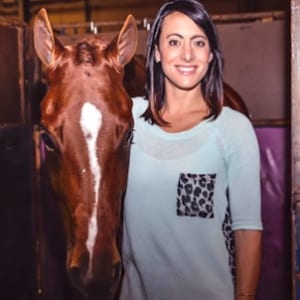 All-around amateur competitor Ali Grusha of Hamburg, Pennsylvania believes time and patience are integral to building a relationship with an equine partner. “My previous horse, Red, wasn’t easy. He was gelded late and was always spooky; as soon as he knew he might get in trouble he would spook. When he was good he was really good, but we also spent many of our early classes in the middle of the arena.”
All-around amateur competitor Ali Grusha of Hamburg, Pennsylvania believes time and patience are integral to building a relationship with an equine partner. “My previous horse, Red, wasn’t easy. He was gelded late and was always spooky; as soon as he knew he might get in trouble he would spook. When he was good he was really good, but we also spent many of our early classes in the middle of the arena.”
Instead of giving up on him, Grusha took her time and learned to deal with his quirks. “I had to learn to calm down, forgive and stay quiet. It took a long time, but after five years we finally began to trust each other.”
Ali says his glimpses of greatness gave her the confidence to keep going. “The night before the showmanship at Congress he was terrified of the Cooper Arena—he was trembling and sweating and spooking other horses. My trainer, Chris Gray, urged me to stick with it; his patience made me patient. The next morning I just knew he was going to be good and we ended up winning the class. It was an incredible moment and made me realize that the horse wanted to do the right thing and that when he was scared, I just had to be there for him.”
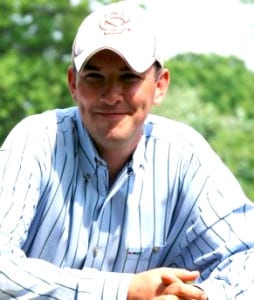 Seth Clark of Jefferson, Ohio operates Eaton-Clark Performance Horses with his wife Amber. He says this partnership is a major benefit when chemistry issues arise. “To me it’s important to communicate with my wife and the customer about the situation. It’s also important to not have an ego and say, maybe it’s me and not the horse. Maybe I just need to stay out of the horse’s way.”
Seth Clark of Jefferson, Ohio operates Eaton-Clark Performance Horses with his wife Amber. He says this partnership is a major benefit when chemistry issues arise. “To me it’s important to communicate with my wife and the customer about the situation. It’s also important to not have an ego and say, maybe it’s me and not the horse. Maybe I just need to stay out of the horse’s way.”
Clark adds that in some cases a horse and rider simply aren’t well matched and it can be in the best interest of horse and rider to make a change. “We’ve had instances where the horse and rider’s personalities just don’t match. Some horses have grit and need a more aggressive rider. If you are hesitant, it’s not going to work. In one case, we had a horse that had more in him than the current rider could reach. We sold him to a girl that is a great match for him. She is more intense and rides him in a way he needs. A lot of times it’s not a talent issue, it’s just that what you’re willing to put in and what the horse is willing to put in are different. It’s important to find a team where the desires and abilities are the same.”
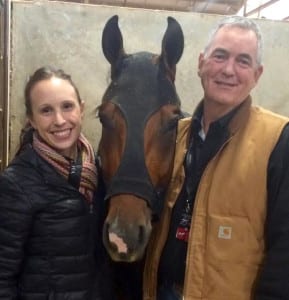 Amateur exhibitor, Nicole Barnes, says that having a trainer who understands her goals and riding style is essential to her success in the show ring. “I strongly believe in the team behind making a show team. My trainer, Brad Kearns, has always thoroughly examined my goals when we are searching for a horse. He always takes time in preparation prior to bringing a specific horse to me as a potential purchase. I cannot think of a time when researching a horse’s history, past owners, show records, etc. didn’t turn out to be advantageous to us in the long run.”
Amateur exhibitor, Nicole Barnes, says that having a trainer who understands her goals and riding style is essential to her success in the show ring. “I strongly believe in the team behind making a show team. My trainer, Brad Kearns, has always thoroughly examined my goals when we are searching for a horse. He always takes time in preparation prior to bringing a specific horse to me as a potential purchase. I cannot think of a time when researching a horse’s history, past owners, show records, etc. didn’t turn out to be advantageous to us in the long run.”
Nicole adds that when a horse doesn’t seem to be working out the rider might need to adapt her vision for the partnership toward the horses’ strengths. “Once I’m mounted on a horse we have to make it work—maybe my horse really likes the trail, so that is my new focus. Or, if he isn’t learning how to change leads quickly enough then I put aside thoughts of showing in Western Riding. Each horse and rider has his or her own strengths and weaknesses. It is my job to find these traits and use them to show my horse to the best of my ability.”
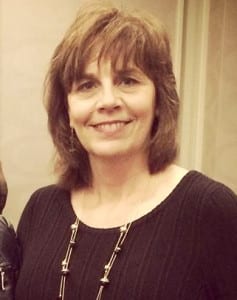 Lynne Puthoff of Puthoff Performance Horses in Laura, Ohio specializes in training all-around and hunter under saddle competitors. When matching a new team she believes time is the most important element. “Be prepared for six months to a year, in my opinion, to become a team and especially when adding new classes you are looking at even more saddle time. I like to give a horse and rider every opportunity possible to make it work.”
Lynne Puthoff of Puthoff Performance Horses in Laura, Ohio specializes in training all-around and hunter under saddle competitors. When matching a new team she believes time is the most important element. “Be prepared for six months to a year, in my opinion, to become a team and especially when adding new classes you are looking at even more saddle time. I like to give a horse and rider every opportunity possible to make it work.”
However, there are instances where horse and rider just don’t get along and no amount of time is going to change that. “After a year of giving it everyone’s best attempt, rider, parent, and trainer need to decide if physical, mental, and event options have all been tried. There are times when a talented rider and a talented horse just do not mesh. At that time the hard choice of moving on needs to be made.”
Trainers offered the following advice to horse owners:
Kevin Dukes: Time is your friend. Don’t make any quick decisions. If you’re currently on your own, find someone reputable to help you through the situation. Live by the theory that it always feels worse than it looks; have someone video your rides because oftentimes that bird’s eye view can make a big difference.
Seth Clark: Make sure you’re communicating with your trainer and that the two of you are on the same page. If you’re on your own remember that it has to be fun first. If you’re dreading riding and you’re frustrated, that’s not a good thing. Yes, we love our horses but we put too much time and money into this to not be happy doing it.
Lynne Puthoff: I talk over goals and time frames, with my youth especially. Communication between trainer, rider and parent for youth is key.


